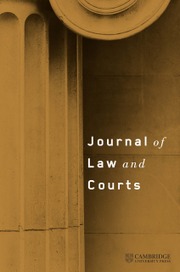No CrossRef data available.
Article contents
Rehabilitating the Declaratory Theory of the Common Law
Published online by Cambridge University Press: 21 October 2022
Abstract
The declaratory theory is that “judge-made law” is discovered, not created. This article describes a scenario in which there develops a legal system such that the declaratory theory is true and shows that judges in the scenario could literally discover what they could justifiably call law. Positivist objections to the theory are rebutted. If true, the declaratory theory has implications for contemporary systems that combine legislation and judge-made law.
- Type
- Research Article
- Information
- Copyright
- © 2014 by the Law and Courts Organized Section of the American Political Science Association. All rights reserved.




